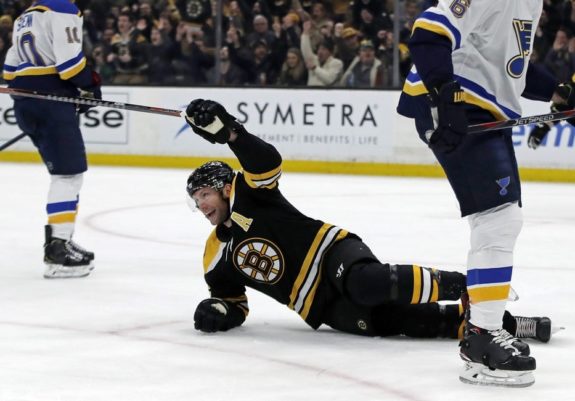When the Boston Bruins signed David Backes to a five-year contract during the summer of 2016, the expectations for him in Boston were very high. With a cap hit of $6 million per season, Backes was projected to play alongside David Krejci on the second line.
Instead, Backes has played primarily in the bottom six for the Bruins, and he has even found himself sitting out games as a healthy scratch for the first time in his career. Backes has seen his production drop each season in Boston and has now taken to dropping the gloves in order to prove his worth on the team.
Backes confirmed recent meeting with Cassidy about his overall play and has chosen to adopt a fighter/enforcer role. Wants to be vital contributor —sees this as way to keep roster spot. Dismisses concussion risk.
— Kevin Paul Dupont (@GlobeKPD) March 6, 2019
Considering Backes’ history of concussions combined with the lessened role of fighting in hockey, this seems to be an unwise decision on the part of both Backes and the Bruins organization as a whole. To get the most out of their lineup, the Bruins should figure out how to get their veteran forward involved in ways that will have a direct impact on the scoresheet.
Bruins and Backes Aware of the Risks
Backes has suffered three concussions since signing in Boston prior to the 2016-17 season, in addition to various other injuries that the 34-year-old power forward has sustained over his 13 seasons in the NHL. While wear and tear is a common part of being an athlete in any sport, Backes’ decision to start dropping the gloves more often only creates more unnecessary risk of injury.
After suffering a concussion from a hit back in November of this season, Backes even admitted that he worries about how concussions could end his career early. Concussions among athletes have been a hot topic in recent years, and in hockey that began with the multiple concussions that Sidney Crosby sustained earlier in his career. The Bruins have also seen first-hand how concussions can derail a career after both Marc Savard and Rick Nash were forced to retire from ongoing concussion issues. This just makes their decision to encourage Backes to keep fighting seem even more strange.

Those who are opposed to fighting have had some strong opinions about how the Bruins are handling this situation right now. In his article for The Globe and Mail, David Shoalts made his opinions known right away by saying, “there is a disgraceful situation unfolding with the Boston Bruins in which the entire management group, from owner Jeremy Jacobs to president Cam Neely to general manager Don Sweeney to head coach Bruce Cassidy, should be ashamed of” (From ‘David Backes and the Boston Bruins should be ashamed of themselves’ – Globe and Mail – 3/8/2019).
It might not be disgraceful, but considering the awareness surrounding concussions and the long-term health impact of such an injury, this decision by both Backes and the organization is definitely not a smart one.
Backes Can Contribute to Bruins Success Without Fists
The Bruins have always been known for their tough and physical style of play. However, over recent years the team has begun to alter their style in order to keep up with the new speed and skill of the NHL. Players like Adam McQuaid and Milan Lucic have been replaced by Matt Gryzelcyk and Jake DeBrusk. Despite shifting their focus away from playing a bruising style of play, the Bruins have found a way to play fast and skilled while still being tough to match up against.
Backes has found a way to play on the edge for the majority of his career. While known for being physical, he has also been able to chip in offensively, recording 546 points in 915 regular season games during his career. His career-high for goals in a season is 31, a mark that he hit twice while a member of the St. Louis Blues, but he has failed to reach the 20-goal milestone during his time in Boston so far.
Despite his personal struggles, the Bruins find themselves near the top of the NHL standings after a 19-game point streak that was snapped on Sunday against the Pittsburgh Penguins.

Even without producing at the rate that Backes has become accustomed to throughout his career, Backes is a leader on this team. Whether in the locker room or on the ice, Backes can bring a lot more to this team than solely a physical presence. Hopefully ,both he and the Bruins figure that out sooner rather than later.